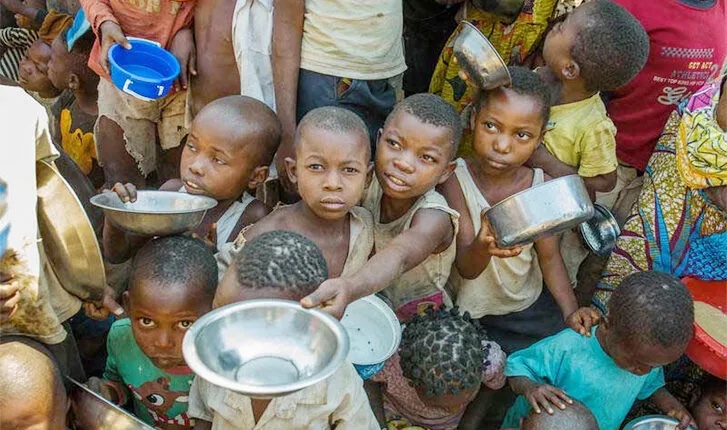The Deteriorating State of Poverty in Nigeria
In a recent report from the World Bank, the grim reality of poverty in Nigeria was laid bare. With the United Nations’ goal of eradicating extreme poverty by 2030 becoming increasingly unrealistic, many are left questioning the effectiveness of Nigeria’s current leadership and policies. “Poverty is not just a statistic; it’s the reality of millions,” said Dr. Ibrahim Alhaji, an economist based in Lagos. “And unfortunately, we are stuck in a cycle of poor governance and misguided policies that have failed to address the root causes.”
According to the World Bank’s “Poverty, Prosperity, and Planet Report,” nearly 700 million people globally survive on less than $2.15 per day, and Nigeria continues to be one of the countries hardest hit by poverty. The report emphasized that Nigeria is not alone in this struggle; many sub-Saharan African nations also experience high levels of poverty and economic fragility. However, Nigeria’s situation is particularly alarming, especially since it has been dubbed the capital of extreme poverty, overtaking India in 2018.
Join our WhatsApp ChannelUnraveling the Causes of Poverty
The factors contributing to Nigeria’s soaring poverty rates are deeply intertwined. A combination of long-standing issues, such as poor economic management, rampant corruption, and the recent removal of subsidies on Premium Motor Spirit, has exacerbated the situation. The removal of these subsidies led to an immediate spike in the cost of living. “The subsidy removal was like a match to dry grass; it ignited an already volatile situation,” remarked Sarah Okwu, a local business owner. “People are struggling to survive.”
Recent statistics show that 40.7% of Nigerians are projected to live below the poverty line by the end of this year. The National Bureau of Statistics reported a decrease in headline inflation to 32.14%, but this has not translated into relief for ordinary citizens. The rising cost of goods and services continues to put pressure on households, particularly in rural areas where poverty is most acute.
The Impact of Insecurity on Poverty
In addition to economic mismanagement, insecurity is a significant driver of poverty in Nigeria. The persistent threat of Boko Haram insurgency in the North-East, banditry in the North-West, and farmer-herder conflicts throughout the country have displaced millions. This insecurity not only prevents farmers from cultivating their land but also contributes to rampant food shortages.
“Every day, I worry whether I can feed my family,” said Ahmed Musa on X, from Kaduna state. “We are losing our livelihoods, and the government doesn’t seem to care.”
The escalating violence has created a vicious cycle, where poverty fuels insecurity and vice versa. As people become impoverished, they may resort to criminal activities to survive, further destabilizing communities.
A Call for Policy Reforms
To address this multi-faceted crisis, experts argue that Nigeria’s leadership must implement effective policies focused on job creation and wealth generation. The World Bank report highlights that it could take over a century to raise incomes above the $6.85-a-day threshold required for upper-middle-income countries. “This isn’t just about numbers; it’s about lives,” said Dr. Clara Opara, a social activist. “If we don’t act now, we’ll be leaving future generations with an even bigger mess.”
READ ALSO: 129 Million Nigerian’s Trapped In Poverty: Is The Govt Listening?
One of the key recommendations is to amend the 1999 Constitution, which many believe centralizes power excessively at the federal level. “States must be empowered to harness their resources and drive their economies,” Dr. Alhaji explained. “The current system of revenue sharing is disincentivizing productivity.”
Additionally, experts suggest that Nigeria should look to successful models like Brazil’s Bolsa Familia program, which effectively reduced extreme poverty. The program combined cash transfers with investments in agriculture and job creation, lifting millions out of poverty. “We need a similar, targeted approach here,” Dr. Opara urged. “Direct cash transfers won’t solve our problems unless they come with a plan for sustainable development.”
The Role of Investment and Security
To attract both domestic and foreign investment, Nigeria must address its ongoing security challenges. As businesses and farmers face continuous threats, many investors shy away from the country. “Without security, there can be no economic growth,” remarked Kola Ibraheem, a business analyst. “Investors want stability; they won’t risk their capital in a volatile environment.”
Efforts must also be made to privatize key state-owned enterprises like the oil refineries and the Ajaokuta Steel Complex. “By privatizing these sectors, Nigeria can stop relying on imports for refined petroleum products,” Kola added. “This would not only save money but also create jobs.”
The Need for Community Empowerment
Finally, addressing poverty in Nigeria requires a community-centered approach. Empowering local communities through education and skill development can create a more resilient population capable of lifting itself out of poverty.
Programmes focusing on micro, small, and medium enterprises (MSMEs) are critical. “The youth have the energy and ideas, but they need support to succeed,” said Sarah Okwu. “We must invest in them.”
The Time for Change is Now
The current poverty crisis in Nigeria is a complex web of historical mismanagement, current policies, and societal challenges. As the World Bank’s report highlights, achieving the goal of ending extreme poverty by 2030 seems increasingly out of reach. However, with a concerted effort from both the government and the citizens, it is possible to create a pathway toward prosperity.
“To defeat poverty, we must be willing to change the way we think and act,” Dr. Alhaji concluded. “The time for change is now, before it’s too late.”
By prioritising effective policies, addressing insecurity, and empowering communities, Nigeria can start to reverse its troubling trend of poverty. The future of millions depends on it.
Emmanuel Ochayi is a journalist. He is a graduate of the University of Lagos, School of first choice and the nations pride. Emmanuel is keen on exploring writing angles in different areas, including Business, climate change, politics, Education, and others.



















Follow Us